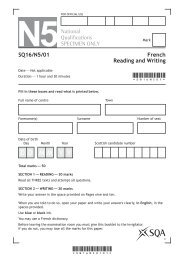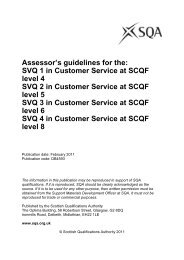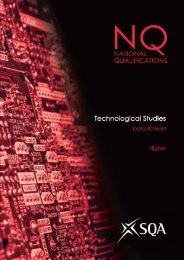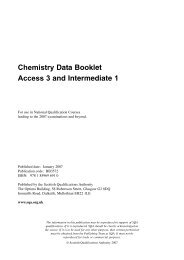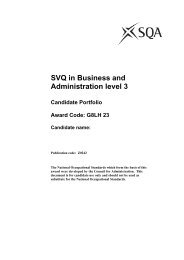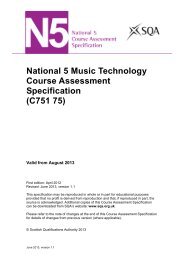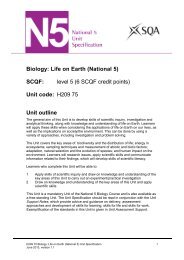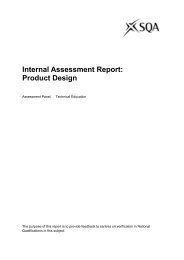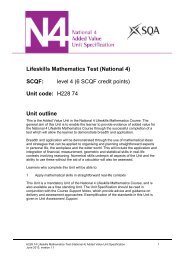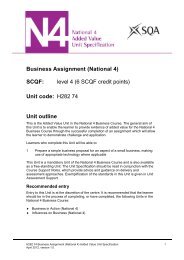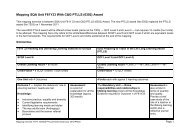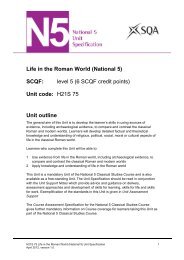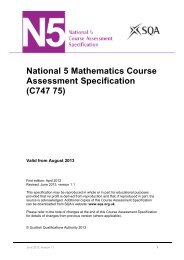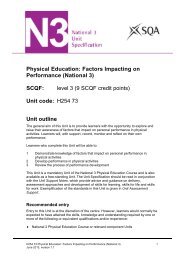Personal Achievement: Fundraising (National 1) Unit SCQF ... - SQA
Personal Achievement: Fundraising (National 1) Unit SCQF ... - SQA
Personal Achievement: Fundraising (National 1) Unit SCQF ... - SQA
Create successful ePaper yourself
Turn your PDF publications into a flip-book with our unique Google optimized e-Paper software.
<strong>Personal</strong> <strong>Achievement</strong>: <strong>Fundraising</strong> (<strong>National</strong> 1)<br />
<strong>Unit</strong><br />
<strong>SCQF</strong>:<br />
level 1 (3 <strong>SCQF</strong> credit points)<br />
<strong>Unit</strong> code: H1GE 41<br />
<strong>Unit</strong> outline<br />
This ‘<strong>Fundraising</strong>’ <strong>Unit</strong> at <strong>National</strong> 1 is part of the <strong>Personal</strong> <strong>Achievement</strong> Award suite of<br />
<strong>Unit</strong>s.<br />
The general aim of this <strong>Unit</strong> is to provide opportunities for the learner to become<br />
involved in fundraising and/or sponsorship activities. Activities could include taking part<br />
and/or working with others in organising: a fun run, a sponsored silence, a sponsored<br />
walk, or a jumble sale.<br />
Learners who complete this <strong>Unit</strong> will be able to:<br />
1 Prepare for an activity involving fundraising<br />
2 Participate in an activity involving fundraising<br />
3 Reflect on the activity involving fundraising by communicating feelings about it<br />
This <strong>Unit</strong> is an optional <strong>Unit</strong> of the <strong>Personal</strong> <strong>Achievement</strong> Award (<strong>National</strong> 1) and is<br />
also available as a free-standing <strong>Unit</strong>. The <strong>Unit</strong> Specification should be read in<br />
conjunction with the combined Award and <strong>Unit</strong> Support Notes, which provides advice<br />
and guidance on delivery, assessment approaches, and development of skills for<br />
learning, skills for life, and skills for work. Exemplification of the standards in this <strong>Unit</strong> is<br />
given in the <strong>National</strong> Assessment Resource.<br />
<strong>Fundraising</strong> (<strong>National</strong> 1) <strong>Unit</strong> Specification 1<br />
April 2012, version 1.0
Recommended entry<br />
Entry to this <strong>Unit</strong> is at the discretion of the centre.<br />
In terms of prior learning and experience, relevant experiences and outcomes may also<br />
provide an appropriate basis for doing this <strong>Unit</strong>.<br />
Equality and inclusion<br />
This <strong>Unit</strong> Specification has been designed to ensure that there are no unnecessary<br />
barriers to learning or assessment. The individual needs of learners should be taken<br />
into account when planning learning experiences, selecting assessment methods, or<br />
considering alternative evidence. For further information please refer to the combined<br />
Award and <strong>Unit</strong> Support Notes.<br />
<strong>Fundraising</strong> (<strong>National</strong> 1) <strong>Unit</strong> Specification 2<br />
April 2012, version 1.0
Standards<br />
Outcomes and assessment standards<br />
Outcome 1<br />
The learner will:<br />
1 Prepare for an activity involving fundraising by:<br />
1.1 Agreeing to an activity<br />
1.2 Being involved in planning the activity<br />
Outcome 2<br />
The learner will:<br />
2 Participate in an activity involving fundraising by:<br />
2.1 Carrying out the activity as planned<br />
2.2 Completing the activity<br />
Outcome 3<br />
The learner will:<br />
3 Reflect on the activity involving fundraising by:<br />
3.1 Communicating one thing about the activity which was liked /disliked<br />
3.2 Communicating the reason for this view<br />
Evidence requirements for the <strong>Unit</strong><br />
Assessors should use their professional judgement, subject knowledge and<br />
experience, and understanding of their learners, to determine the most appropriate<br />
ways to generate evidence and the conditions and contexts in which they are used.<br />
It is expected that learners will receive support to achieve the outcomes of this <strong>Unit</strong>.<br />
In this <strong>Unit</strong>, evidence requirements are as follows:<br />
Evidence for Outcomes 1, 2, and 3<br />
Evidence for this <strong>Unit</strong> could include observation checklists, logs, short recorded oral<br />
responses, photographic evidence, video evidence, or their equivalent.<br />
Exemplification of assessment will be provided in the <strong>National</strong> Assessment Resource.<br />
Advice and guidance on possible approaches to assessment is provided in the<br />
combined Award and <strong>Unit</strong> Support Notes.<br />
<strong>Fundraising</strong> (<strong>National</strong> 1) <strong>Unit</strong> Specification 3<br />
April 2012, version 1.0
Development of skills for learning, skills for life,<br />
and skills for work<br />
It is expected that learners will develop broad, generic skills through this <strong>Unit</strong>. The skills<br />
that learners will be expected to improve on and develop through the <strong>Unit</strong> are based on<br />
<strong>SQA</strong>’s Skills Framework: Skills for Learning, Skills for Life and Skills for Work and<br />
drawn from the main skills areas listed below. These must be built into the <strong>Unit</strong> where<br />
there are appropriate opportunities.<br />
1 Literacy<br />
1.3 Listening and talking<br />
3 Health and wellbeing<br />
3.1 <strong>Personal</strong> learning<br />
3.2 Emotional wellbeing<br />
3.5 Relationships<br />
Amplification of these is given in <strong>SQA</strong>’s Skills Framework: Skills for Learning, Skills for<br />
Life and Skills for Work. The level of these skills should be at the same <strong>SCQF</strong> level of<br />
the <strong>Unit</strong> and be consistent with the <strong>SCQF</strong> level descriptor. Further information on<br />
building in skills for learning, skills for life, and skills for work is given in combined the<br />
Award and <strong>Unit</strong> Support Notes.<br />
<strong>Fundraising</strong> (<strong>National</strong> 1) <strong>Unit</strong> Specification 4<br />
April 2012, version 1.0
Administrative information<br />
Published: April 2012 (version 1.0)<br />
Superclass:<br />
BA<br />
History of changes to Award <strong>Unit</strong> Specification<br />
Version Description of change Authorised by Date<br />
© Scottish Qualifications Authority 2012<br />
This specification may be reproduced in whole or in part for educational purposes<br />
provided that no profit is derived from reproduction and that, if reproduced in part, the<br />
source is acknowledged. Additional copies of this <strong>Unit</strong> can be downloaded from <strong>SQA</strong>’s<br />
website at www.sqa.org.uk.<br />
Note: readers are advised to check <strong>SQA</strong>’s website: www.sqa.org.uk to ensure they are<br />
using the most up-to-date version of the <strong>Unit</strong> Specification.<br />
<strong>Fundraising</strong> (<strong>National</strong> 1) <strong>Unit</strong> Specification 5<br />
April 2012, version 1.0



